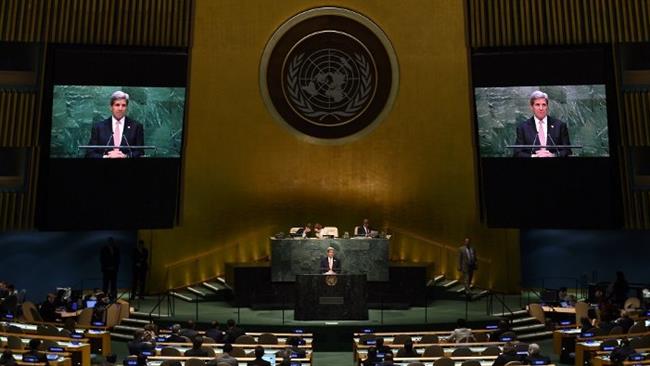A senior Iranian official has blamed the US, the UK and Canada for the failure of the 2015 Review Conference of the Parties to the Non-Proliferation Treaty (NPT) to adopt a final document aimed at achieving a Middle East free of nuclear weapons.
“The onus for the failure of the conference is clearly on the US, UK and Canada,” Hamid Baeidinejad, the director general for political and international security affairs at Iran’s Foreign Ministry, wrote in a message posted on his Instagram account.
After four weeks of negotiations, the 2015 NPT Review Conference ended without agreement in New York on Friday, after the United States, Britain and Canada opposed a proposal to set up a nuclear weapons-free zone in the Middle East. The Israeli regime also opposed the proposal.
“Whereas after four weeks of round-the-clock negotiations, it was expected that the conference would succeed in approving the final document of the conference today (Friday), the US, the UK and Canada suddenly announced this afternoon that they cannot agree to the text proposed by the presidency of the conference on account of being unhappy with the segment of the text relating to the creation of a region free of nuclear weapons in the Middle East,” Baeidinejad said.
The final draft of the conference’s concluding statement was expected to task the UN with convening an international conference by March 2016 on creating a Middle East free of nuclear weapons, with or without Israel’s participation.
Israel, the sole possessor of a nuclear arsenal in the Middle East, is a non-signatory to the NPT.
Following Israel’s objection, US Arms Control Under Secretary Rose Gottemoeller told the conference that provisions on holding the conference were “incompatible with our long-standing policies.”
Gottemoeller argued that the proposed idea did not stand a chance of success without the consent of all sides involved, referring to Israel’s opposition.
Britain also said the terms for convening the conference were “a stumbling block for us,” while Canada said it could not agree to the document because of the provisions.
Criticizing the three countries for blocking a consensus, Baeidinejad said Iran, as the rotating president of the Non-Aligned Movement, spared no effort to have a final text documented.
He said the US, UK and Canada are willing to shoulder “the high cost of their opposition to the document only to safeguard the interests of a non-party regime to the treaty that has endangered peace and security in the Middle East and the world by developing nuclear weapons capability.”
The Tel Aviv regime defies global calls to join the NPT and does not allow international inspectors to observe its nuclear program.
